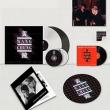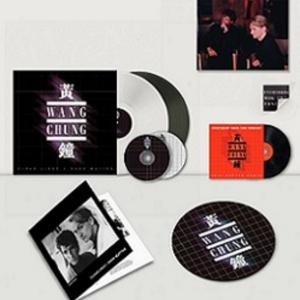Wang Chung’s career retrospective
Wang Chung: Clear Light/Dark Matter (SING, 2 CDs and/or 2 LPs, 89 min.). This is a career retrospective that reveals the many layers of Wang Chung's music. It spans the band's four-decade career, featuring a curated selection of their greatest hits, deep cuts and even previously unreleased music in its 21 tracks. The release showcases the duality that defines Wang Chung: the upbeat, infectious energy of songs like "Everybody Have Fun Tonight" and "Dance Hall Days," balanced with deeper, complex rhythms and experimental production.
Some of the '80s biggest and most enduring hits were created by Wang Chung, including "Dance Hall Days," "Everybody Have Fun Tonight," "Let's Go," "To Live and Die in L.A.," "Hypnotize Me" and “Fire in the Twilight.”
Tracks like "Dance Hall Days" blend African Burundi shuffle rhythms with electronic elements and rock instrumentation, while "Everybody Have Fun Tonight" intertwines a Motown-inspired chord structure with modern dance production. Wang Chung has a penchant for blending styles, such as funk, pop, rock and even progressive elements, often within a single track.
Wang Chung, originally Huang Chung, is an English New Wave band, formed in 1980 in London by Nick Feldman (guitar), Jack Hues (lead vocals, guitar) and Darren Costin (drummer). Wang Chung is Mandarin, meaning "yellow bell" in English and is the first note in the Chinese classical music scale. An earlier version of the band, called 57 Men, also included bassist Leigh Gorman, keyboardist Simon Campbell and vocalist Glenn Gregory. After 18 months, it was back to the core trio as Gorman went on to play bass in Adam and the Ants, and afterwards in Bow Wow Wow, and Gregory became lead vocalist for Heaven 17.
Thus, it is no surprise that “Dance Hall Days,” “Everybody Have Fun Tonight” and the previously-unreleased demo “True Love” (1982) all sound similar to “Heaven 17” in production approach. Most of the tracks on the first disc date from 1983 through 1989, with “Space Junk” from 1996 and the live “Fire in the Twilight” recorded in Toronto in June 2024. “Fire in the Twilight” first appeared in the film “The Breakfast Club.”
One of the more complex tracks is “Praying to a New God,” while “Wait” also is from the “To Live and Die in L.A.” film.
The second disc contains four unreleased demos and an edit of the recently-released new remix of “Everybody Have Fun Tonight” by acclaimed remixer Eric Kupper, known for his work with Whitney Houston, Alicia Keys, Depeche Mode, Diana Ross and Earth, Wind & Fire. In addition to “True Love,” the demos are “Eyes of the Girls,” “Dance Hall Days” and a somewhat different “To Live and Die in L.A.”
Deeper cuts are “Separate Lives” (1982) and the very early “Ti Na Na.” B-sides include the instrumental “The Waves” and “Ornamental Elephant.” There also is the mostly instrumental outtake “This One’s for You” from “To Live and Die in L.A.” The song “Isn’t It About Time We Were on TV,” the band’s first release on Rewind Records in 1980, seems very gay-friendly, with lyrics like “I’m sick of watching boys. I’m sick of listening to their jokes.”
"Our songs often have an accessible front end, but there's always a deeper layer beneath the surface -- whether it's lyrically or musically. ‘Clear Light/Dark Matter’ reflects that balance between the light and the dark, the yin and yang, or as we like to say, the Wang and the Chung of what we do," said Feldman in a press release.
The release also is available in a deluxe version that includes both the 2 CDs and 2 LPs, plus a 7-inch single with both club and dub versions of Kupper’s remix of “Everybody Have Fun Tonight,” a booklet with photos provided by Feldman and Hues and written notes by Hues, a turntable mat, a semi-gloss photo and a sticker.
The band is currently on Rick Springfield’s “I Want My ‘80s Tour,” along with John Waite. The closest the tour will come is July 8 at the Hartford Health Amphitheater in Bridgeport, CT. Grade: album A-
Four new Quadio reissues
Rod Stewart: Atlantic Crossing (1975, Warner/Rhino, Blu-ray, 44:30). This is the quadrophonic debut of Stewart’s sixth solo album. Recorded in five American studios, including Muscle Shoals in Alabama, it was produced by Tom Dowd and peaked at number one in the U.K. (his fourth solo album to do so) and number nine on the Billboard Top Pop Albums chart. The album was divided into a fast side and a slow side, which Wikipedia says was at the suggestion of his then-girlfriend, Swedish actress Britt Ekland.
The album is highlighted by two of Stewart’s most-popular songs, covers of the ballad “I Don’t Want to Talk About It” and the Sutherland Brothers Band’s “Sailing,” here sung with a chorus and, like several of the tracks, with an extended instrumental ending. Other fine covers are of “Drift Away” (the Dobie Gray hit) and Motown’s “This Old Heart of Mine,” in a tasteful arrangement.
This was Stewart’s last solo album while he was still with Faces. It marked the end of his association with Faces-mates Ronnie Wood and Ian McLagan, who had been his core collaborators on his classic run of Mercury Records albums that fused soul and folk. Used were session musicians, including The Memphis Horns and Booker T. and the MG’s, whose Steve Cropper co-wrote two of the songs, one being the reggae beat-influenced “Alright for an Hour.” The only song performed from the album on The Faces’ final U.S. tour in autumn 1975 was the bright, playful, Stewart-penned "Three Time Loser," as the rest of the group disliked Stewart's change in musical direction on this album. (I saw The Faces with Rod Stewart in 1973 at Northwestern University, Evanston, IL.)
Sometimes in the quadrophonic mix, Stewart’s vocals seem too low, such as on the guitar-dominated “All in the Name of Rock ‘N’ Roll,” another of Stewart’s five compositions on the album – three were solo, including this one. Another solid one co-written with Cropper was “Stone Cold Sober.” Grade: album A
All four Quadio releases include Hi-Res stereo versions as well.
ZZ Top: Tres Hombres (1973, Warner/Rhino, Blu-ray, 33:22). Originally released on London Records, “Tres Hombres” was the Texan trio’s third studio album. It became their breakthrough album in the U.S., peaking at number eight on the Billboard 200 chart. The classic boogie single "La Grange” reached number 41 on the Billboard Hot 100.
The songs were written by guitarist-lead vocalist Billy Gibbons, mostly in collaboration with bassist-vocalist Dusty Hill. Drummer Frank Beard contributed to the writing of four tracks, including “La Grange” and the bluesy “Jesus Just Left Chicago,” which the opening guitar-workout “Waitin’ for the Bus” flows seamlessly into. The aggressive “Beer Drinkers & Hell Raisers” is fueled by guitars and a steady beat. More melodic is the slower “Hot, Blue and Righteous.”
Also good are the rocker “Move Me on Down the Line,” the bluesier grind “Precious and Grace” and “Have You Heard?” with its slide guitar. Grade: album A-
The Modern Jazz Quartet: Blues on Bach (1974, Atlantic/Rhino, Blu-ray, 61:43). Growing out of Dizzy Gillespie’s Big Band rhythm section, The Modern Jazz Quartet carved a niche in intersecting baroque counterpoint alongside strong blues groundwork. It was formed in 1952 and consisted of John Lewis (piano, harpsichord), Milt Jackson (vibraphone), Percy Heath (bass), and various drummers, most notably Kenny Clarke (1952 to 1955) and, here, Connie Kay (1955 to 1994).
The album alternates tracks that rearrange Johann Sebastian Bach pieces with original blues compositions (in the keys that spell out “B-A-C-H”), the first two by Lewis and the second two by Jackson. Lewis’ are the lively “Blues in B Flat” and “Blues in A Minor” with its piano runs. Jackson’s best is “Blues in C Minor.”
The five pieces arranged from Bach originals are: "Regret?" from the chorale prelude for organ, “The Old Year Has Now Passed Away”; "Rise Up in the Morning" from the chorale “Sleepers Awake”; "Precious Joy" from the most-familiar chorale “Jesu Joy of Man’s Desiring”; "Don't Stop This Train" from the fugue in D Minor from the “Clavierbuechlein”; and "Tears from the Children" from Prelude 8 from Bach’s "The Well Tempered Clavier” and Bach’s “Fugue in D Minor” from the “Clavierbuechlein.” All are good, but “Precious Joy” stands out the most due to its more famous source. The quadrophonic sound is evenly distributed. Grade: album A-
Beaver & Krause: Gandharva and All Good Men (1971, 1972, Warner/Rhino, Blu-ray, 70:16). This marks the quadrophonic debut of both albums. Frequently known as Robert Moog’s West Coast synthesizer salesmen, Paul Beaver and Bernie Krause became cult-favorite electronic music pioneers. With these two albums, the duo explored pop-leaning arrangements, while venturing into their escape from early Moog synthesizers. With arrangement contributions from Jimmie Haskell (Simon & Garfunkel, Dean Martin, Bette Midler), “All Good Men represents a pivotal moment in the intersection of experimental and popular music.
“Gandharva (The Celestial Musician)” (34:22) is described as a musical soundtrack for a non-existent film. Its tracks include a thick sound to “Saga of the Blue Beaver”; Patricia Halloway scatting and wailing on “Walkin’”; and a female-led chorus on the following “Walkin’ By the River” (the first real vocal track). There are nice horns on “Good Places.” “Gandharva” was partly recorded in Grace Cathedral in San Francisco and included musical contributions from Gerry Mulligan, Bud Shank, Mike Bloomfield and Ronnie Montrose.
On “All Good Men” (35:54), there are more vocals, including male vocals on “Looking Back Now” and “Child of the Morning Sun,” and a female on “All Good Men.” Group vocals are found on the opening cover of Scott Joplin’s “A Real Slow Drag.” The weird “Legend Days Are Over” repeats its title a lot and has some old woman’s dialogue open and close the track. Elizabeth Williams sings “Sweet William,” the best track. Grades: “Gandharva” C+; “All Good Men” C
About this blog:

My music review column, Playback, first ran in February 1972 in The Herald newspapers of Paddock Publications in Arlington Heights, IL. It moved to The Camden Herald in 1977 and to The Courier Gazette in 1978, where it was joined by my home video reviews in 1993. The columns ran on VillageSoup for awhile, but now have this new home. I worked at the Courier Gazette for 29 years, half that time as Sports Editor. Recently, I was a selectman in Owls Head for nine years.




























